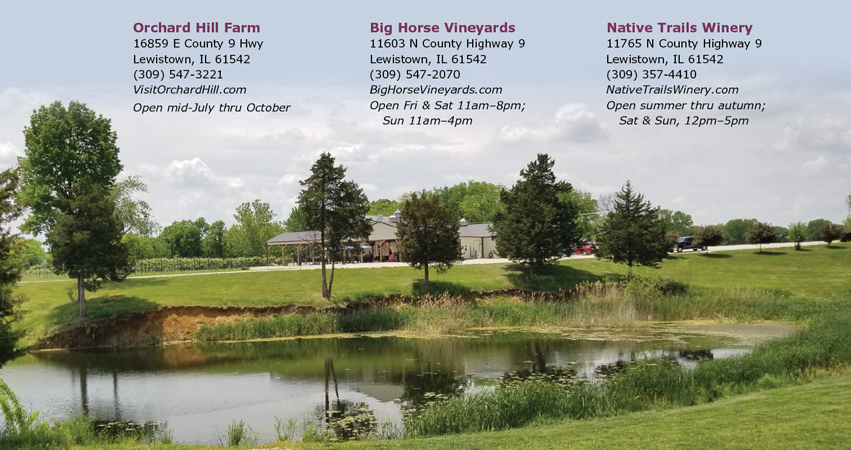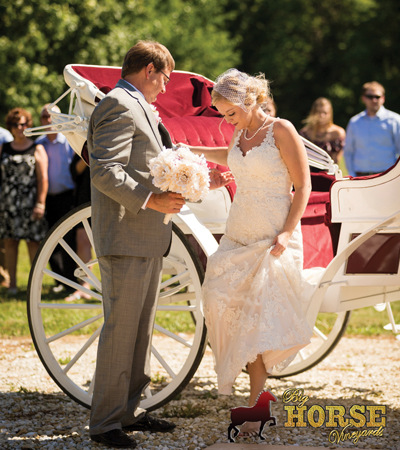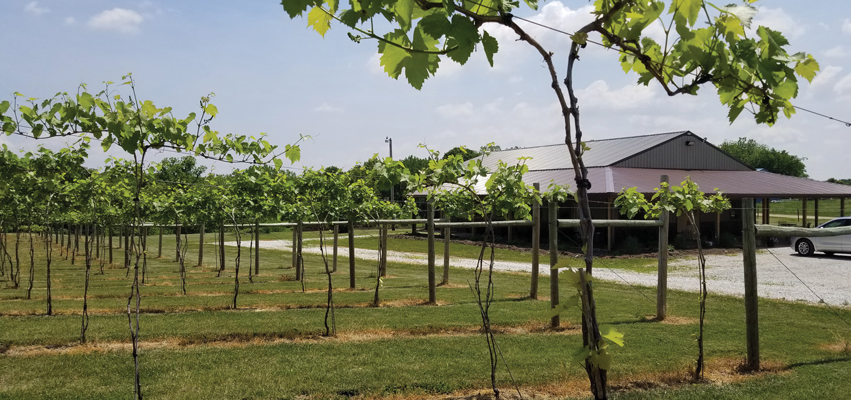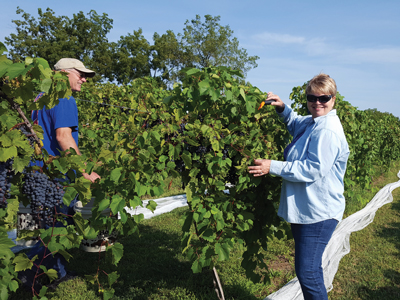Spend a weekend or a day exploring the emerging wine industry (and more) in rural Fulton County.
With summer comes that desire to ramble… maybe a drive along country lanes and rural backroads. An amble southwest of Peoria may provide the respite you’re seeking… along with a few wine-derful stops along the way.
Located near the famed Spoon River, Lewistown, Illinois, is a quaint town with historic charm. Poet Edgar Lee Masters brought fame to the region in 1915 with Spoon River Anthology, its short, free-verse poems describing the residents of the fictional town of Spoon River. The actual village of Lewistown was founded in 1823, making it the oldest town in Fulton County. It has been home to a brick factory, and once had a flourishing trade in woolen goods and haberdashery. Today, Lewistown is cultivating a new and thriving wine industry.
Orchard Hill Farm
Located near the Emiquon National Wildlife Refuge, Orchard Hill Farm is the perfect place to take the family for an afternoon of fun. Wes and Stephanie Carithers grew up taking family trips to the iconic orchard, which dates back to 1933—so the couple was thrilled when it went on the market in 2016.
“We fell in love with the place,” Wes explains. “My background is in agriculture… so it was a perfect match. I love fruit trees, the place was well established, and I grew up near here. It was just meant to be.” Stephanie echoes her husband’s enthusiasm. “When I was a kid, we always took the Spoon River Scenic Drive every fall and we always stopped here. Who knew it would one day be mine?”
The Carithers realized it would take a lot to bring the trees back to full production. “We’re now renovating the orchard,” Wes says. “It’s a tremendous amount of work, but we needed to do it.” There are currently 15 acres of apple trees, and Wes is planting more to replace older ones and others that have become damaged over the years. “We produce 25 varieties of apples right now, and last year we planted one acre of peaches. Those should be ready by mid-July. The remainder of the land is a combination of corn, beans and timber.”
The couple is already planning for autumn, their busiest season. “We are a family destination,” Stephanie explains, “so we offer all types of kid-related activities. Last year we introduced ‘Friday Night Frights,’ where we offered a pumpkin and gourd patch, kids’ games and a family-friendly corn maze from 5:00 until 8:00pm. Only after 8:00 did things become a bit spookier with a scarier corn maze, a haunted pumpkin patch and the Apple Orchard Trail—that’s more fitting for adults.”
As their guests celebrate the witching season, they can enjoy one of the legendary apple dumplings—”a crowd favorite”—or caramel apple that are “to die for,” Stephanie says. There’s a variety of fruits, jams and jellies for sale, along with specialty popcorn and locally harvested honey—and the Carithers plan to add more bounty to their place each year.
In 2017, the orchard began selling wine. By partnering with an area winemaker, Wes arranged to have 120 gallons of apple cider made into 600 bottles of apple wine. Guests can enjoy four wines this season: One Bad Apple and Blueberry Thrill; Arrow Head Red—a nod to the area’s deep Native American roots; and Eclipse, a Pinot Noir. “Our current wines are all sweet,” Wes adds. “We have them produced for us and then choose the names and labels that best describe them.”
Orchard Hill also hosts a range of events. “We’ve had wine and paint nights, food and band events, even a community wiener roast last fall,” Stephanie says. “We don’t want folks to just come once—we want to build a relationship… so families will return year after year, just like our families did. We’d like to become a family tradition.”

Above: Big Horse Vineyards offers locally-made wines in a scenic country setting, with a large deck overlooking the lake, vineyard and horse park.
Big Horse Vineyards
Just a short drive west from Orchard Hill, you’ll find Big Horse Vineyards, where the hills and valleys lend themselves to prime viticulture. Owned and operated by Don and Trinity Archdale, the winery sits on several acres of Indian Ridge Farm, where Don grew up. “As a kid, I helped with the horses,” he explains. “My family’s always raised and showed draft horses: Belgians, Clydesdales and Percherons. Today the horses pull wagons and carriages for guest rides, and folks can wander out and see them while taking in the vineyards.”
But owning big horses can be expensive—and so can owning a vineyard and winery. Don and Trinity decided the family’s passion for horses had to play into the winery theme, so the horses became a marketing device for Big Horse Vineyards. “Just something about the big horses and the vineyards seemed right,” Don said. “Six years ago we planted a thousand of the old-style grapevines—like Concord, Niagara, Catawba, Cayuga White and Vignoles. We had our first harvest in 2016 when we opened the winery.”
Currently there are nine wines at the tasting bar, all with names that are horse-related. Blond Belgian is a sweet blend of Vignoles and Niagara grapes; Romeo Red is a sweet Concord and Catawba blend. Classic Red is composed of sweet Concord grapes; Midnight Jazz makes an intriguing blackberry/blueberry blend. Peach Fuzz, Pear and Harvest Gold (from Illinois apples) round out the sweet fruit offerings. With a nod to the drier, Italian style of winemaking, there’s Moonlight, crafted from Vignoles grapes, and Racehorse Red, made from Norton. The winery is using a regional winemaker to craft its wines, but Don says he and his wife are having a large-scale production facility built further down the road where Big Horse will soon make their own.
“Sunday Funday” events at the vineyards are always popular, offering food and live music. “We’ve had barbeques, chili cookoffs, crab boils… whatever we think will be fun for our customers,” Don says. And speaking of food, Big Horse is home to a bistro that touts a seasonal menu along with ribeye steaks, salmon, pork chops, chicken and brick oven pizzas.
Later this year, Big Horse Inn and Suites will open in Lewistown. According to Trinity, it will be a small boutique hotel with a country equine theme. “It’ll be perfect for our wedding customers and also for folks visiting the region for the wines, and for the Spoon River Drive.”
With big plans for the future, Big Horse Vineyards offers a down-home country atmosphere with plenty to keep the entire family entertained.

Native Trails Winery offers red and white wines made from locally-grown grapes, while its picturesque and winding trails are available for guests to enjoy nature and the beautiful scenery.
Native Trails Winery
Right next door to Big Horse, you’ll discover a vineyard that lauds the region’s Native American heritage. Native Trails Winery was a natural moniker for the place. “The land borders Dickson Mounds, the Oneota Indians were here (from 1300 to 1600 AD), the native trails are still here, and that heritage runs deep in the region,” says owner Bill Nayden. “It just seemed like a good fit.”
In 2006, Bill purchased 110 acres of land, including some adjacent to Dickson Mounds, a National Historic Site. With an ag science degree from Western Illinois University, he knew he would plant some type of fruit. He’d heard that wine grapes had a promising future, so he traveled the state visiting wineries. It didn’t take him long to decide this was a lifestyle he would enjoy. Today, an acre and a half of vineyards feature Corot Noir, Marquette, Frontenac, Chardonnel and Cayuga White grapes. “Some varieties date back to when the Native Americans were here,” Bill adds.
The wine list at Native Trails consists of nine vinos—five dry and four sweet offerings. The dry wines include Corot Noir, a hybrid of Seyve-Villard and Steuben grapes with an intense, dark red color and cherry-like aromas. Frontenac has a tasting profile that imparts notes of cherry and cedar. Red Sunset is a blend of Corot Noir, Frontenac and Chambourcin grapes. Chardonnel is a French-American hybrid from Seyval and Chardonnay grapes, and Four Winds Rosé, its newest offering, is an interesting blend of 75% Frontenac and 25% Marquette grapes.
The sweet wines include Vignoles, a white vino with a crisp finish, and Indian Summer, a sweeter version of Frontenac. Sundance is a blush blend of Concord and Niagara, while Moondance is a white grape blend made in a sweeter style. Native Trails does not craft its own vinos, but it does provide the grapes and oversees the winemaking process, handled by a regional winery.
In addition to wines, Native Trails offers native arts crafted by Bill’s son, Zachery, in the tasting room. “My son makes the antler wine racks, antler bottle stoppers and antler knives,” he explains. “The knives are replicas of local Indian knives that have been discovered in this area.”
Bill has big plans for the winery this season. “We will be expanding the patio and the building, and offering more outdoor events with live music. And we’re going to be hosting more art vendors during the Spoon River Scenic Drive this fall.” The winery currently hosts bridal showers, outdoor weddings, private parties and reunions.
Sharing a border with Dickson Mounds has created a unique opportunity for Native Trails. “I’ve been working with Fulton County and Dickson Mounds to help promote the region and the trails,” Bill explains. “One day, I’d like to establish several miles of trails for walking and running—maybe even for mountain biking. I think cabins would be a great addition, too.” With a distinctive nod toward the land’s Native American roots, Native Trails Winery offers a chance to sip and celebrate the free spirit of an earlier time in history. a&s
Turn a day away into a weekend getaway with a visit to Dickson Mounds, which offers 15,000 square feet of exhibits, artifacts, Native American arts and hands-on activities.


